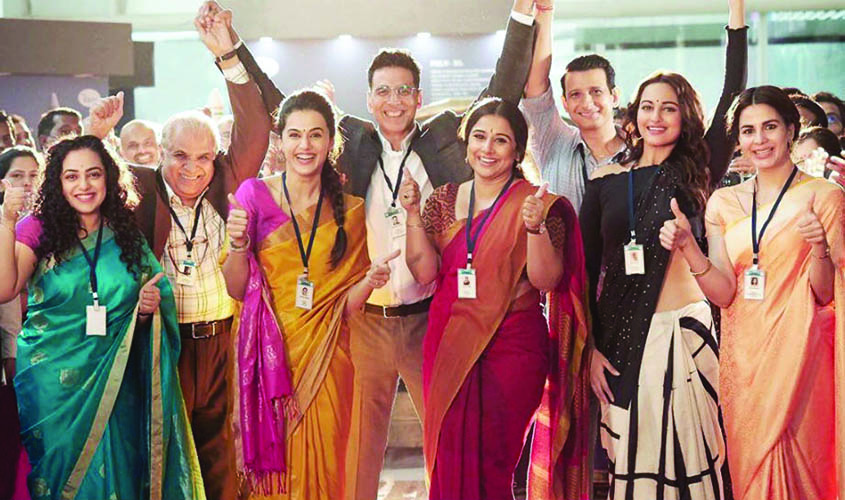On 5 November 2013, Indian Space Research Organisation (ISRO) successfully launched a space probe to undertake a 298-day transit to Mars as part of the Mars Orbiter Mission (MOM) aka Mangalyaan. The probe reached Mars orbit on 24 September 2014. It was India’s first interplanetary mission, making it the first Asian nation to reach Martian orbit and the first country in the world to do so in its maiden attempt. Overall, ISRO became the fourth space agency to reach Mars, after Roscosmos, NASA, and the European Space Agency. The Mars Orbiter Mission team went on to win the Space Pioneer Award in 2015. An image taken by the MOM spacecraft was the cover photo of the November 2016 issue of National Geographic magazine. Also, an illustration of the spacecraft is featured on the reverse of the INR 2,000 Indian currency note.
Jagan Shakti’s Mission Mangal is loosely based on the story of ISRO scientists who contributed to the success of Mangalyaan. Other than the fact that the film is based on of the Mars Orbiter Mission, the film’s biggest USP is its stellar ensemble cast featuring Akshay Kumar, Vidya Balan, Taapse Pannu, Sonakshi Sinha, Nithya Menen, Kirti Kulhari, Sharman Joshi, H. G. Dattatreya, Sanjay Kapoor, Dalip Tahil, and Vikram Gokhale. It also features cameos from Mohammed Zeeshan Ayyub, Purab Kohli, and Mohan Kapoor. Now, bringing such a diverse set of actors together is certainly commendable and so fittingly the casting team led by Himesh Choudhary, Karan Mally, and Nandini Shrikent and gets a prominent place in the opening credits.
Just like Chak De! India, Mission Mangal starts on a losing note. As a major ISRO mission comes to a sudden halt, senior space scientist Rakesh Dhawan (essayed by Akshay Kumar) is transferred to the Mars Mission unit as a punishment. But, he is unperturbed by the failure. Along with his resourceful colleague Tara Shinde (played by Vidya Balan), he puts together a new team for the mission. The team, mostly comprising freshers, must battle insurmountable odds in order to realize a mission that some of the world’s most experienced scientists have failed to achieve in their first attempt.
There are some who might feel that Mission Mangal offers a rather frivolous take on a serious subject like space science. But commercial Hindi cinema is often forced to operate within its constraints. And, within the constraints, Mission Mangal does a decent job at telling a compelling tale of scientific achievement. Here is a film that will inspire youngsters to follow their dreams. It will perhaps also help grown-ups in reigniting their long forgotten dreams. Now, a well-made documentary on the subject may do greater justice to the scientific detail but it may not have the same impact on the masses. Mission Mangal is an exercise in how to make a crowd-puller while dealing with a serious subject. But if you are looking for a film like The Martian or Gravity or Interstellar then you are looking in the wrong direction.

